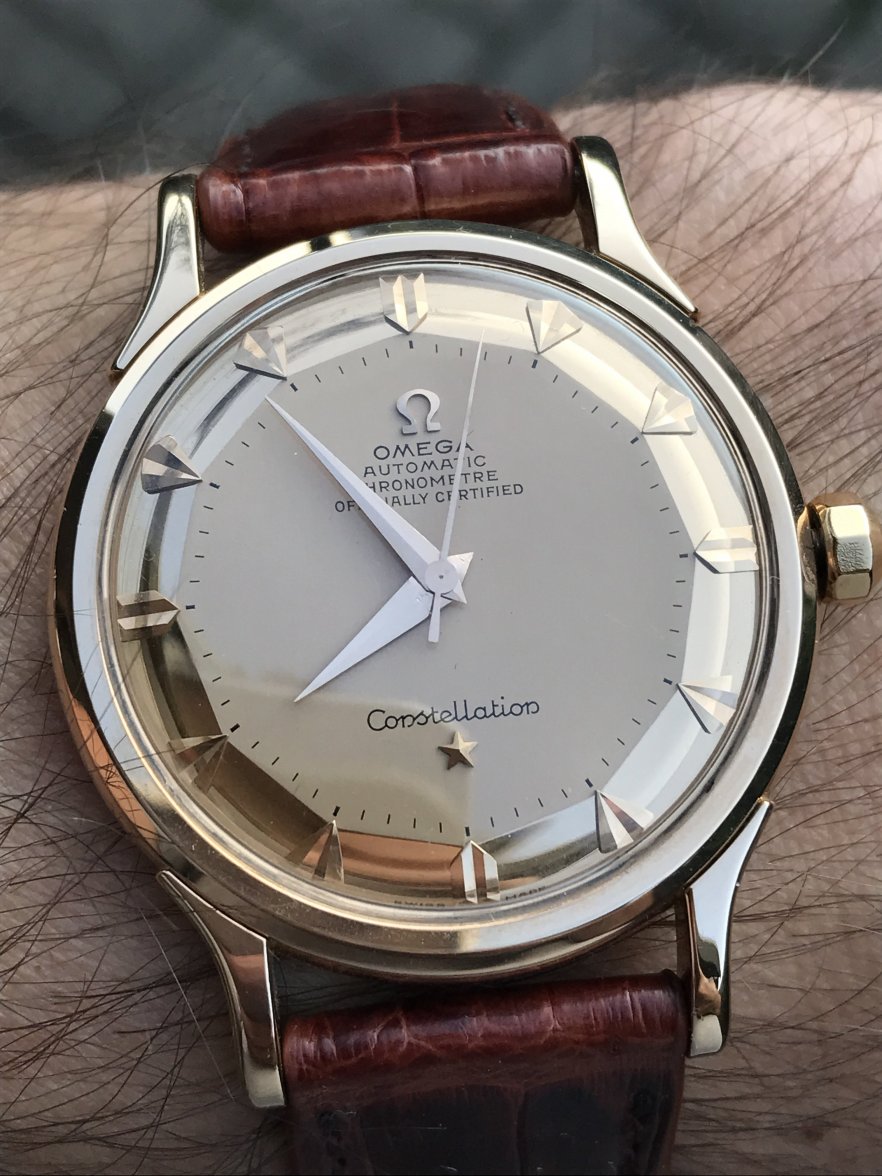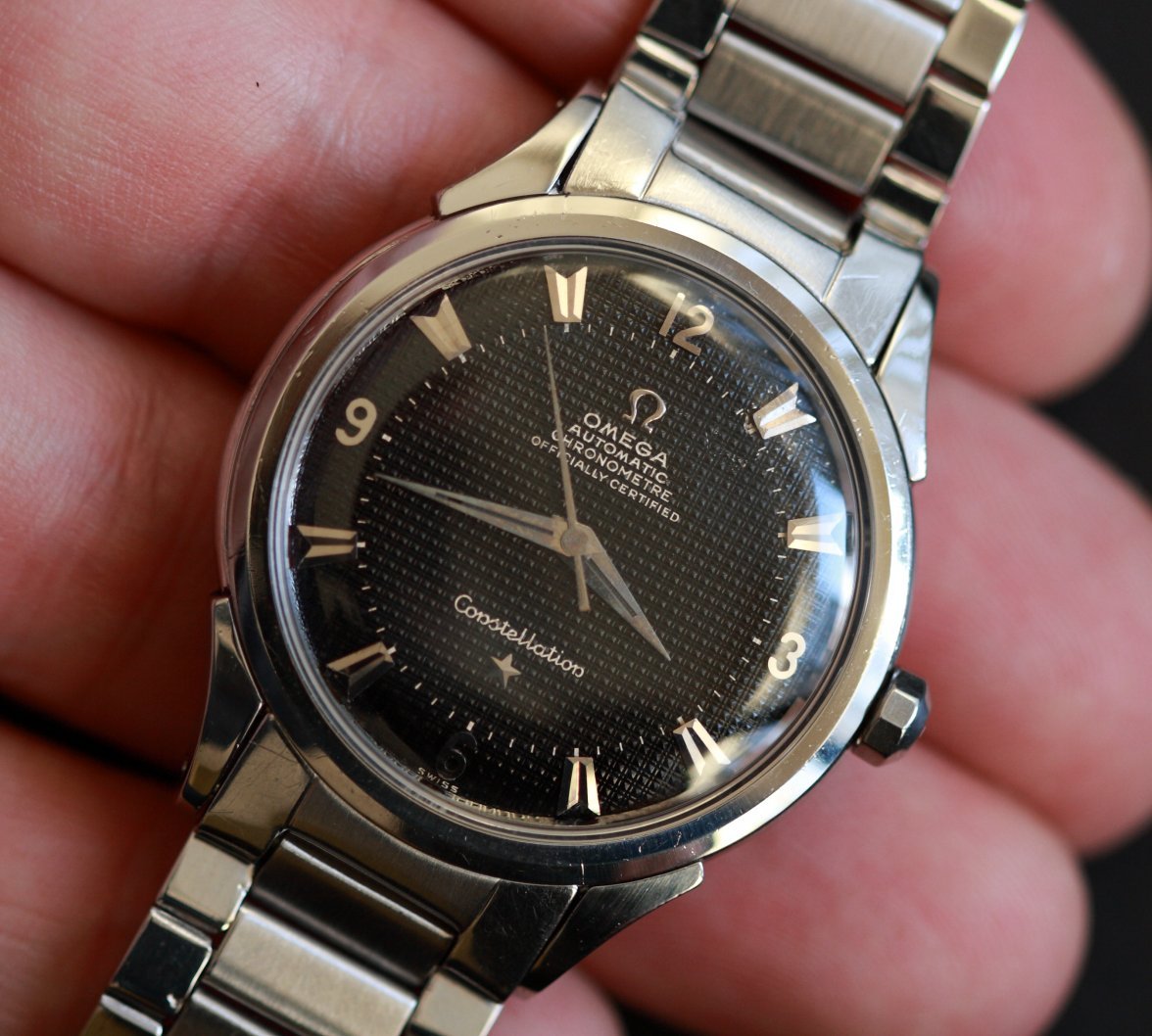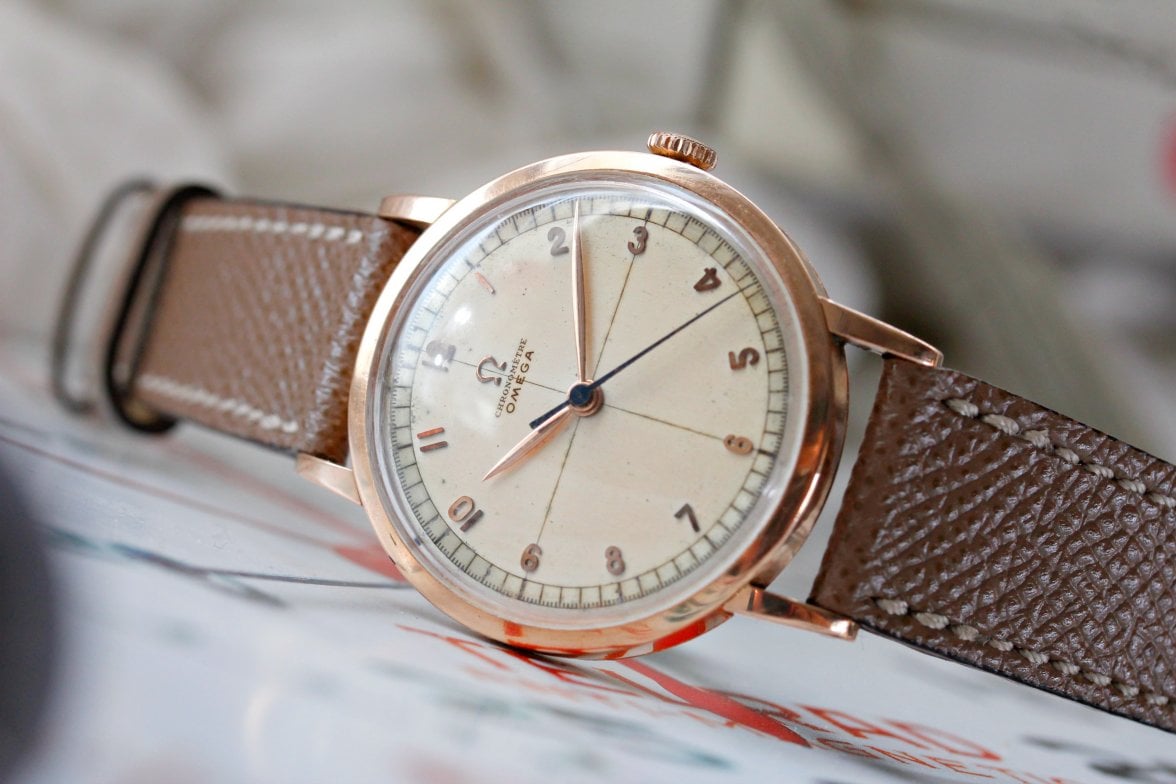
Omega Vintage
- nick10
- moderator
- Δημοσιεύσεις: 11848
- Εγγραφή: Παρ Ιούλ 31, 2009 5:12 pm
- Has thanked: 7101 times
- Been thanked: 12217 times
- Επικοινωνία:
Re: Omega Vintage

- These users thanked the author nick10 for the post (total 3):
- giannistissot (Δευ Οκτ 09, 2017 4:24 pm) • ppana (Δευ Οκτ 09, 2017 8:40 pm) • Megalos (Δευ Οκτ 09, 2017 9:45 pm)
- Rating: 23.08%
Το watchfunclub στα μέσα κοινωνικής δικτύωσης!
Fb: https://www.facebook.com/groups/118633621493682/
Instagram: https://www.instagram.com/watchfunclub/
Το γούστο μου είναι απλό, διαλέγω πάντα το καλύτερο...

Fb: https://www.facebook.com/groups/118633621493682/
Instagram: https://www.instagram.com/watchfunclub/
Το γούστο μου είναι απλό, διαλέγω πάντα το καλύτερο...

- Megalos
- Διαχειριστής
- Δημοσιεύσεις: 45047
- Εγγραφή: Τετ Μάιος 13, 2009 3:05 am
- Τοποθεσία: Athens
- Has thanked: 43254 times
- Been thanked: 9666 times
Re: Omega Vintage
nick10 έγραψε:

Το watchfunclub στα μέσα κοινωνικής δικτύωσης!
Facebook: https://www.facebook.com/groups/118633621493682/
Instagram: https://www.instagram.com/watchfunclub/
Facebook: https://www.facebook.com/groups/118633621493682/
Instagram: https://www.instagram.com/watchfunclub/
- nick10
- moderator
- Δημοσιεύσεις: 11848
- Εγγραφή: Παρ Ιούλ 31, 2009 5:12 pm
- Has thanked: 7101 times
- Been thanked: 12217 times
- Επικοινωνία:
Re: Omega Vintage

- Rating: 7.69%
Το watchfunclub στα μέσα κοινωνικής δικτύωσης!
Fb: https://www.facebook.com/groups/118633621493682/
Instagram: https://www.instagram.com/watchfunclub/
Το γούστο μου είναι απλό, διαλέγω πάντα το καλύτερο...

Fb: https://www.facebook.com/groups/118633621493682/
Instagram: https://www.instagram.com/watchfunclub/
Το γούστο μου είναι απλό, διαλέγω πάντα το καλύτερο...

-
Αλεξανδρος Σιαχος
- Δημοσιεύσεις: 1409
- Εγγραφή: Πέμ Αύγ 04, 2011 2:39 pm
- Has thanked: 0
- Been thanked: 345 times
- Megalos
- Διαχειριστής
- Δημοσιεύσεις: 45047
- Εγγραφή: Τετ Μάιος 13, 2009 3:05 am
- Τοποθεσία: Athens
- Has thanked: 43254 times
- Been thanked: 9666 times
Re: Omega Vintage
πανεμορφο με αυτο τον χρωματισμο ... δεν ειναι συνηθισμενο χρωμα αν δεν απατωμαιnick10 έγραψε:
Το watchfunclub στα μέσα κοινωνικής δικτύωσης!
Facebook: https://www.facebook.com/groups/118633621493682/
Instagram: https://www.instagram.com/watchfunclub/
Facebook: https://www.facebook.com/groups/118633621493682/
Instagram: https://www.instagram.com/watchfunclub/
- nick10
- moderator
- Δημοσιεύσεις: 11848
- Εγγραφή: Παρ Ιούλ 31, 2009 5:12 pm
- Has thanked: 7101 times
- Been thanked: 12217 times
- Επικοινωνία:
Re: Omega Vintage
Όχι τα μαύρα καντράν είναι πιο σπάνιαMegalos έγραψε:πανεμορφο με αυτο τον χρωματισμο ... δεν ειναι συνηθισμενο χρωμα αν δεν απατωμαιnick10 έγραψε:
Το watchfunclub στα μέσα κοινωνικής δικτύωσης!
Fb: https://www.facebook.com/groups/118633621493682/
Instagram: https://www.instagram.com/watchfunclub/
Το γούστο μου είναι απλό, διαλέγω πάντα το καλύτερο...

Fb: https://www.facebook.com/groups/118633621493682/
Instagram: https://www.instagram.com/watchfunclub/
Το γούστο μου είναι απλό, διαλέγω πάντα το καλύτερο...

- Megalos
- Διαχειριστής
- Δημοσιεύσεις: 45047
- Εγγραφή: Τετ Μάιος 13, 2009 3:05 am
- Τοποθεσία: Athens
- Has thanked: 43254 times
- Been thanked: 9666 times
Re: Omega Vintage
αρα καλα ειπα οτι ειναι πιο ομορφο .... και σπανιο τελικα 
- Rating: 7.69%
Το watchfunclub στα μέσα κοινωνικής δικτύωσης!
Facebook: https://www.facebook.com/groups/118633621493682/
Instagram: https://www.instagram.com/watchfunclub/
Facebook: https://www.facebook.com/groups/118633621493682/
Instagram: https://www.instagram.com/watchfunclub/
- nick10
- moderator
- Δημοσιεύσεις: 11848
- Εγγραφή: Παρ Ιούλ 31, 2009 5:12 pm
- Has thanked: 7101 times
- Been thanked: 12217 times
- Επικοινωνία:
Re: Omega Vintage
Found One Of The First Tourbillon Wristwatches Ever Made (And It's An Omega)
A true masterpiece is on the block at Phillips Geneva.
The Phillips Geneva Watch Auction: Six is just around the corner, slated to commence on November 11th and it will surprise no one that there are any number of stellar lots to choose from. One in particular really stands out for me, however, and though it's a bit inside-baseball, it's also one of the most historically and technically interesting watches Phillips has ever offered (which is saying something).
Tourbillon wristwatches have become, if not ubiquitous, at least unremarkable nowadays (although there is and always should be room for admiration for tourbillons that are really well done, which is true of mechanical horology in general – both in terms of ubiquity, and what it is we ought to admire).
However, for much of the history of the tourbillon, they were quite rare, and for good reason: they required great skill and precision to make. Tourbillon makers vied with each other not only for the prestige that went along with making them, but also for honors in the observatory chronometer time trials, and some of the most famous observatory tourbillons were made by some of the most prestigious names in watchmaking – perhaps most famously, by Patek Philippe, starting in the 1940s (one of these tourbillon movements was cased for, and worn by, Patek's Philippe Stern; it's now in the Patek Philippe Museum).

The first tourbillon wristwatch appears to have been made by Lip, who produced a rectangular tourbillon wristwatch prototype in 1931 or 1932. Very small tourbillon movements that could theoretically have been placed in a wristwatch were made by other firms (including Patek) but as they were intended for time trials or made as showcases for the maker's ingenuity, they were generally not cased as wristwatches; another example is the tourbillon movement made by Fritz-André Robert-Charrue, of Le Locle, which was completed around 1945, and which was only 19.7mm in diameter.
People who are interested in these early tourbillons are also generally aware of Omega's 19 jewel, caliber 30 I tourbillon movements. There were 12 made in total and all were 30mm in diameter, so as to allow them to compete in the wristwatches category at the Geneva observatory competitions. Until recently, it was generally believed that they were not actually cased until 1987, when seven of the twelve movements were discovered by Omega, refinished and rebuilt, cased as wristwatches, and sold to collectors. One of these is still in the Omega Museum. However, the example Phillips has on offer is in a steel case, and appears to have the distinction of having been cased in 1947 as a prototype wristwatch.

This particular movement, notably, is not one of the 12 previously known to have existed; according to Phillips, who cite correspondence and drawings in the Omega archives, it appears to have been created specifically for the wristwatch prototype you see here. The lot notes read, in part:
"In a letter dated 1947 and preserved in the Omega Museum, Mr. Marcel Vuilleumier, head of the Watchmaking School of the Vallée de Joux, dreading the arrival of American and British timepieces, underlines the necessity of the Swiss watchmaking industry to concentrate on precision timepieces and suggests creating a tourbillon wristwatch. Recently, an original drawing from the year 1947 of the design of a tourbillon wristwatch prototype case was discovered that further illustrates the proceedings towards the integration of the Calibre 30 I tourbillon movement into a production wristwatch."

Like its 12 previously known brethren, this is a no-nonsense timekeeping machine, created at a time when the tourbillon was thought potentially capable of delivering just enough of a marginal edge in closeness of rate in the vertical positions, to be worth exploring for the observatory competitions. There's really no finishing to speak of in the conventional sense but the makers of this movement would have not had the slightest interest in cosmetics (George Daniels famously remarks in Watchmaking that when watchmakers have no technical problems to solve, that they divert themselves with creating a jewel-like finish; certainly the creators of caliber 30 I had technical problems to solve!)

The movement is notable for the period of rotation of the tourbillon: 7.5 minutes, rather than the more conventional sixty seconds; it was thought that the slower speed would give the benefits of constant alteration of the position of the balance and escapement, while reducing the inertial loads associated with a faster speed. The movement is also equipped with a Guillaume bimetallic balance and a steel balance spring – at the time, the Guillaume balance still offered better temperature compensation than the nickel-steel, Nivarox-type balance springs that were being introduced.
With its exotic tourbillon, high-test balance, and absolutely top-level materials and quality of construction, this tourbillon wristwatch represents the state of the art in wrist-portable timekeeping tech in the mid-20th century. It's interesting to reflect that the first electric wristwatches would appear just ten years later – the Hamilton Electric debuted in 1957, and though that watch had no real advantages over purely mechanical watches, it was followed just three years later by the Bulova Accutron, which really was revolutionary.


This particular Omega tourbillon comes to Phillips with the endorsement of the Omega Museum, and the listing shows some of the original photos of the cased movement from the Omega archives. For anyone who wants a piece of real watchmaking history and who finds the mechanical pursuit of precision timekeeping irresistible, this is about as good as it gets.
The estimate on this extremely important watch is $103,000-207,000, though it could easily end up selling for much more than that.
πηγή: https://www.hodinkee.com/articles/one-o ... s-an-omega" onclick="window.open(this.href);return false;
Αξίζει να το διαβάσετε, πολύ ενδιαφέρον άρθρο για ένα από τα 12 πρωτότυπα Omega Tourbillon του 1947!
A true masterpiece is on the block at Phillips Geneva.
The Phillips Geneva Watch Auction: Six is just around the corner, slated to commence on November 11th and it will surprise no one that there are any number of stellar lots to choose from. One in particular really stands out for me, however, and though it's a bit inside-baseball, it's also one of the most historically and technically interesting watches Phillips has ever offered (which is saying something).
Tourbillon wristwatches have become, if not ubiquitous, at least unremarkable nowadays (although there is and always should be room for admiration for tourbillons that are really well done, which is true of mechanical horology in general – both in terms of ubiquity, and what it is we ought to admire).
However, for much of the history of the tourbillon, they were quite rare, and for good reason: they required great skill and precision to make. Tourbillon makers vied with each other not only for the prestige that went along with making them, but also for honors in the observatory chronometer time trials, and some of the most famous observatory tourbillons were made by some of the most prestigious names in watchmaking – perhaps most famously, by Patek Philippe, starting in the 1940s (one of these tourbillon movements was cased for, and worn by, Patek's Philippe Stern; it's now in the Patek Philippe Museum).

The first tourbillon wristwatch appears to have been made by Lip, who produced a rectangular tourbillon wristwatch prototype in 1931 or 1932. Very small tourbillon movements that could theoretically have been placed in a wristwatch were made by other firms (including Patek) but as they were intended for time trials or made as showcases for the maker's ingenuity, they were generally not cased as wristwatches; another example is the tourbillon movement made by Fritz-André Robert-Charrue, of Le Locle, which was completed around 1945, and which was only 19.7mm in diameter.
People who are interested in these early tourbillons are also generally aware of Omega's 19 jewel, caliber 30 I tourbillon movements. There were 12 made in total and all were 30mm in diameter, so as to allow them to compete in the wristwatches category at the Geneva observatory competitions. Until recently, it was generally believed that they were not actually cased until 1987, when seven of the twelve movements were discovered by Omega, refinished and rebuilt, cased as wristwatches, and sold to collectors. One of these is still in the Omega Museum. However, the example Phillips has on offer is in a steel case, and appears to have the distinction of having been cased in 1947 as a prototype wristwatch.

This particular movement, notably, is not one of the 12 previously known to have existed; according to Phillips, who cite correspondence and drawings in the Omega archives, it appears to have been created specifically for the wristwatch prototype you see here. The lot notes read, in part:
"In a letter dated 1947 and preserved in the Omega Museum, Mr. Marcel Vuilleumier, head of the Watchmaking School of the Vallée de Joux, dreading the arrival of American and British timepieces, underlines the necessity of the Swiss watchmaking industry to concentrate on precision timepieces and suggests creating a tourbillon wristwatch. Recently, an original drawing from the year 1947 of the design of a tourbillon wristwatch prototype case was discovered that further illustrates the proceedings towards the integration of the Calibre 30 I tourbillon movement into a production wristwatch."

Like its 12 previously known brethren, this is a no-nonsense timekeeping machine, created at a time when the tourbillon was thought potentially capable of delivering just enough of a marginal edge in closeness of rate in the vertical positions, to be worth exploring for the observatory competitions. There's really no finishing to speak of in the conventional sense but the makers of this movement would have not had the slightest interest in cosmetics (George Daniels famously remarks in Watchmaking that when watchmakers have no technical problems to solve, that they divert themselves with creating a jewel-like finish; certainly the creators of caliber 30 I had technical problems to solve!)

The movement is notable for the period of rotation of the tourbillon: 7.5 minutes, rather than the more conventional sixty seconds; it was thought that the slower speed would give the benefits of constant alteration of the position of the balance and escapement, while reducing the inertial loads associated with a faster speed. The movement is also equipped with a Guillaume bimetallic balance and a steel balance spring – at the time, the Guillaume balance still offered better temperature compensation than the nickel-steel, Nivarox-type balance springs that were being introduced.
With its exotic tourbillon, high-test balance, and absolutely top-level materials and quality of construction, this tourbillon wristwatch represents the state of the art in wrist-portable timekeeping tech in the mid-20th century. It's interesting to reflect that the first electric wristwatches would appear just ten years later – the Hamilton Electric debuted in 1957, and though that watch had no real advantages over purely mechanical watches, it was followed just three years later by the Bulova Accutron, which really was revolutionary.


This particular Omega tourbillon comes to Phillips with the endorsement of the Omega Museum, and the listing shows some of the original photos of the cased movement from the Omega archives. For anyone who wants a piece of real watchmaking history and who finds the mechanical pursuit of precision timekeeping irresistible, this is about as good as it gets.
The estimate on this extremely important watch is $103,000-207,000, though it could easily end up selling for much more than that.
πηγή: https://www.hodinkee.com/articles/one-o ... s-an-omega" onclick="window.open(this.href);return false;
Αξίζει να το διαβάσετε, πολύ ενδιαφέρον άρθρο για ένα από τα 12 πρωτότυπα Omega Tourbillon του 1947!
- Rating: 7.69%
Το watchfunclub στα μέσα κοινωνικής δικτύωσης!
Fb: https://www.facebook.com/groups/118633621493682/
Instagram: https://www.instagram.com/watchfunclub/
Το γούστο μου είναι απλό, διαλέγω πάντα το καλύτερο...

Fb: https://www.facebook.com/groups/118633621493682/
Instagram: https://www.instagram.com/watchfunclub/
Το γούστο μου είναι απλό, διαλέγω πάντα το καλύτερο...

- markosgr28
- moderator
- Δημοσιεύσεις: 12838
- Εγγραφή: Πέμ Ιούλ 16, 2009 6:19 pm
- Τοποθεσία: Ηράκλειο, Κρήτης
- Has thanked: 23 times
- Been thanked: 5242 times
- nick10
- moderator
- Δημοσιεύσεις: 11848
- Εγγραφή: Παρ Ιούλ 31, 2009 5:12 pm
- Has thanked: 7101 times
- Been thanked: 12217 times
- Επικοινωνία:
Re: Omega Vintage
Η Ω ήταν από τις πλέον πρωτοπόρες ελβετικές εταιρείες(και ακόμα είναι) και τα tourbillon που έβγαλε το αποδεικνύουν. Όχι μόνο ήταν πρωτοποριακό ρολόι για την εποχή του, αλλά και πανέμορφο. Απλό, λιτό, δεν φωνάζει πουθενά ότι είναι tourbillon, όπως τα σημερινά, ούτε να το δεις δεν μπορείς αν δεν το ανοίξεις. Είναι αυτό που έχει γραφτεί πολλές φορές, "Η ομορφιά της απλότητας"markosgr28 έγραψε:Πολύ ενδιαφέρον και μπράβο στην Ω! Ευχαριστώ!
Ορίστε άλλη μια ομορφιά:

- These users thanked the author nick10 for the post (total 3):
- giannistissot (Δευ Νοέμ 13, 2017 7:49 pm) • ppana (Δευ Νοέμ 13, 2017 8:18 pm) • Megalos (Δευ Νοέμ 20, 2017 10:43 pm)
- Rating: 23.08%
Το watchfunclub στα μέσα κοινωνικής δικτύωσης!
Fb: https://www.facebook.com/groups/118633621493682/
Instagram: https://www.instagram.com/watchfunclub/
Το γούστο μου είναι απλό, διαλέγω πάντα το καλύτερο...

Fb: https://www.facebook.com/groups/118633621493682/
Instagram: https://www.instagram.com/watchfunclub/
Το γούστο μου είναι απλό, διαλέγω πάντα το καλύτερο...


